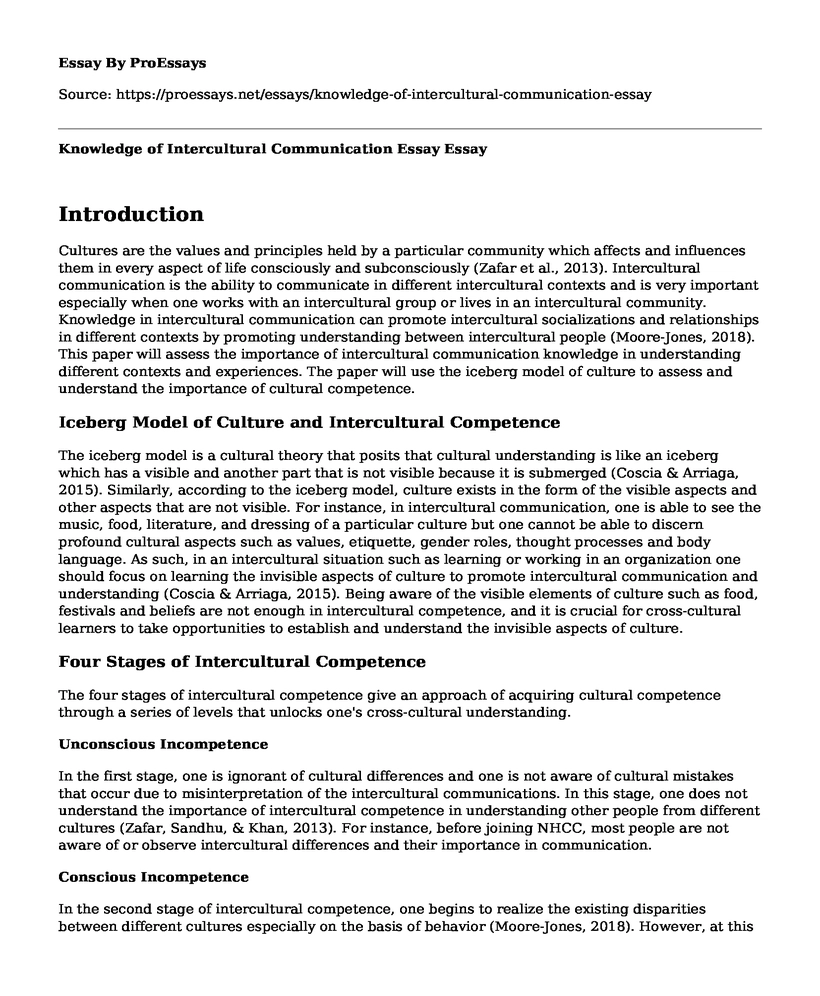Introduction
Cultures are the values and principles held by a particular community which affects and influences them in every aspect of life consciously and subconsciously (Zafar et al., 2013). Intercultural communication is the ability to communicate in different intercultural contexts and is very important especially when one works with an intercultural group or lives in an intercultural community. Knowledge in intercultural communication can promote intercultural socializations and relationships in different contexts by promoting understanding between intercultural people (Moore-Jones, 2018). This paper will assess the importance of intercultural communication knowledge in understanding different contexts and experiences. The paper will use the iceberg model of culture to assess and understand the importance of cultural competence.
Iceberg Model of Culture and Intercultural Competence
The iceberg model is a cultural theory that posits that cultural understanding is like an iceberg which has a visible and another part that is not visible because it is submerged (Coscia & Arriaga, 2015). Similarly, according to the iceberg model, culture exists in the form of the visible aspects and other aspects that are not visible. For instance, in intercultural communication, one is able to see the music, food, literature, and dressing of a particular culture but one cannot be able to discern profound cultural aspects such as values, etiquette, gender roles, thought processes and body language. As such, in an intercultural situation such as learning or working in an organization one should focus on learning the invisible aspects of culture to promote intercultural communication and understanding (Coscia & Arriaga, 2015). Being aware of the visible elements of culture such as food, festivals and beliefs are not enough in intercultural competence, and it is crucial for cross-cultural learners to take opportunities to establish and understand the invisible aspects of culture.
Four Stages of Intercultural Competence
The four stages of intercultural competence give an approach of acquiring cultural competence through a series of levels that unlocks one's cross-cultural understanding.
Unconscious Incompetence
In the first stage, one is ignorant of cultural differences and one is not aware of cultural mistakes that occur due to misinterpretation of the intercultural communications. In this stage, one does not understand the importance of intercultural competence in understanding other people from different cultures (Zafar, Sandhu, & Khan, 2013). For instance, before joining NHCC, most people are not aware of or observe intercultural differences and their importance in communication.
Conscious Incompetence
In the second stage of intercultural competence, one begins to realize the existing disparities between different cultures especially on the basis of behavior (Moore-Jones, 2018). However, at this stage, one is not aware of the extent of the differences, but one can be able to discern the existence of a problem based on the cultural differences.
Conscious Competence
In this stage, one is aware of the existence of cultural differences, and in this level, one can discern some of the cultural disparities and begins to adjust one's behavior to conform with the other cultural point of view (Moore-Jones, 2018). However, it is essential to make a conscious effort because it is not natural in the process replacing previous points of views and one can be able to discern other people cultural perspective by being objective.
Unconscious Competence
In this level of intercultural competence, one is aware of the appropriate cross-cultural behavior that is appropriate in different situations (Zafar et al., 2013). Therefore, one is reconditioned at this stage towards understanding the new cultural meanings, and one can be termed as culturally sensitive.
Based on the four stages of intercultural competence I can be able to trace back my journey to intercultural competence which took shape upon joining NHCC. At the beginning of learning in NHCC, I was in the second state of intercultural competence. Currently, I am at the conscious competence stage in that I am aware of cultural differences and I am mindful of my behavior to ensure I am in line with the expectations colleague's cultural expectations. I was influenced to understand intercultural competence by the need to be culturally competent because the world is becoming culturally diverse which require cultural competence to be able to understand other people.
References
Coscia, M., & Arriaga, C. (2015). The cultural iceberg. ARGENTINIAN JOURNAL OF APPLIED LINGUISTICS, 3(2), 91-10
Moore-Jones, P. J. (2018). Intercultural Sensitivity, Intercultural Competence & Intercultural Intelligence: A Review of the Literature and a Proposition of a Linear Relationship. Journal of Education and Culture Studies, 2(2), 75.
Zafar, S., Sandhu, S. Z., & Khan, Z. A. (2013). A Critical Analysis of 'Developing Intercultural Competence in the Language Classroom by Bennett, Bennett, and Allen. World Applied Sciences Journal, 21(4), 565-571.
Cite this page
Knowledge of Intercultural Communication Essay. (2022, Aug 01). Retrieved from https://proessays.net/essays/knowledge-of-intercultural-communication-essay
If you are the original author of this essay and no longer wish to have it published on the ProEssays website, please click below to request its removal:
- Questions and Answers on Ethics, Charity, Animal Rights
- Celtic, Chinese and Japan Musical Culture Essay Example
- Essay Sample on Text Messaging and Internet on Language
- Long Term Romantic Relationship - Essay Sample
- Paper Example on Volunteering: Benefits for Non-Profits and Society
- Embracing Diversity: A Must For Success in Business Today - Essay Sample
- Paper Sample on Group Therapy: Identifying & Coping with Shared Experiences







